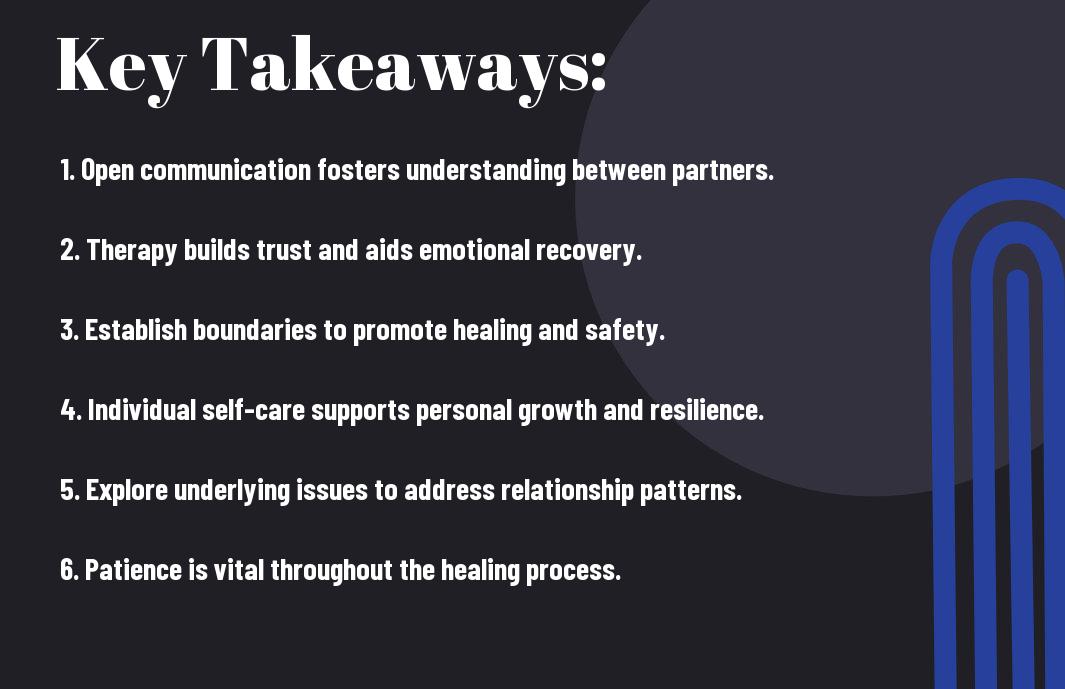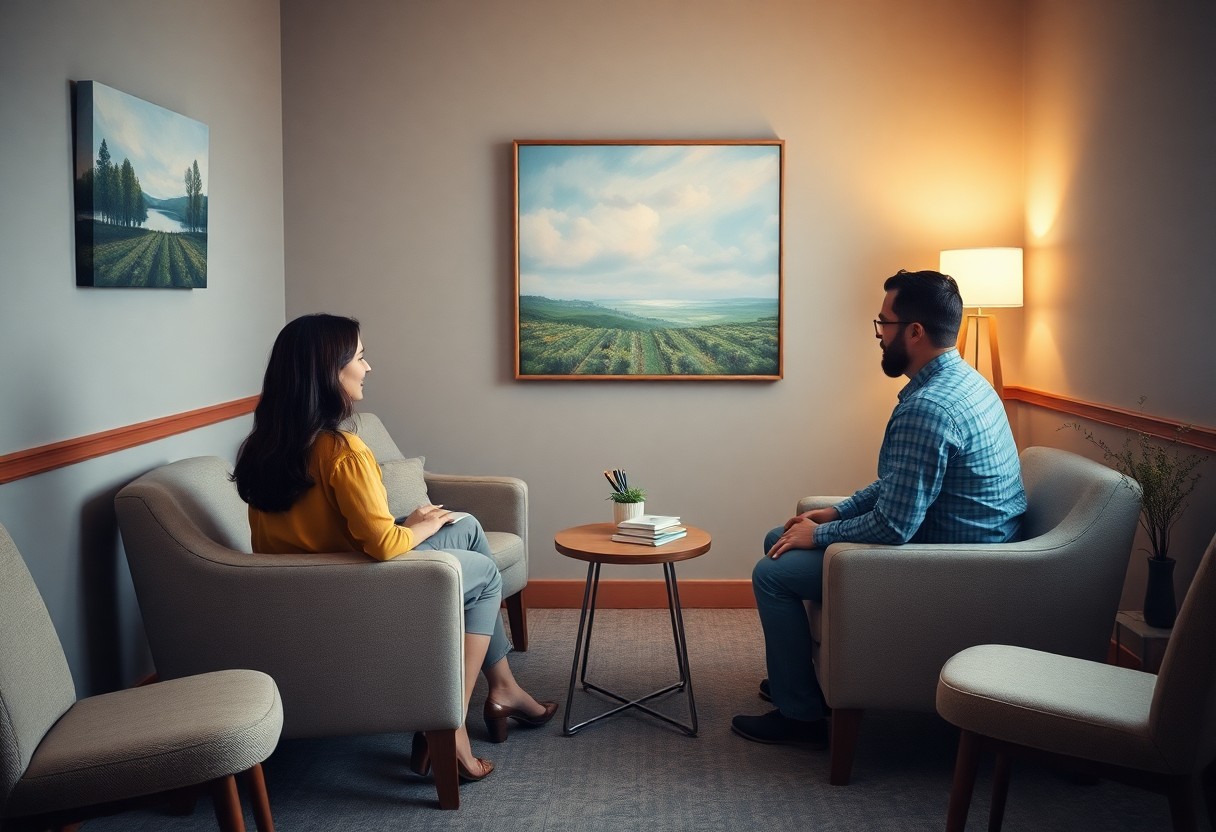Most relationships face challenges, and discovering a physical affair can be devastating for both partners. As you navigate through the heartache, knowing the right therapy tools can help you rebuild trust and reconnect with your partner. In this post, you’ll explore various techniques and strategies that will empower you on your journey to healing. By utilizing these tools effectively, you can foster open communication and develop a deeper understanding of yourself and your partner, paving the way for a healthier relationship moving forward.
Key Takeaways:
- Honest communication between partners is imperative in rebuilding trust after a physical affair.
- The role of therapy in navigating emotions and understanding the underlying issues contributing to the affair is vital.
- Setting clear boundaries and expectations moving forward can help both partners feel secure in the relationship.
- Self-reflection and accountability are necessary for the person who had the affair to understand their actions and refrain from repeating them.
- Engaging in individual therapy can provide personal insights and support during the healing process for both partners.
- Establishing new shared activities and experiences can help couples reconnect and strengthen their bond.
- Recognizing and addressing emotional triggers is important for both partners to navigate their feelings effectively.

Understanding the Impact of Infidelity
Your journey post-infidelity can be emotionally overwhelming, deeply affecting not just your relationship but also your personal well-being. The layers of betrayal can stir feelings of anger, confusion, and sadness, which may manifest in various aspects of your life. Recognizing this impact is the first step in healing and rebuilding the trust that was lost.
Emotional and Psychological Effects
Understanding the emotional turmoil that both partners experience after infidelity is imperative. The betrayed often wrestles with feelings of inadequacy, while the betrayer may deal with guilt and shame. These emotions can create a tumultuous atmosphere, impacting mental health and exacerbating feelings of isolation and hurt.
Rebuilding Trust and Connection
With intentional effort and open communication, it is possible to restore the connection that was damaged. The path to rebuilding trust involves consistent, honest conversations about feelings and boundaries, as well as acknowledging the hurt caused. It’s important to prioritize emotional safety and allow vulnerability, ensuring both partners feel valued and understood.
And as you work on reconnection, establishing new routines and shared activities can help strengthen your bond. You should set aside time for discussions focused not only on the past but also on your future together. Creating an environment where you both strive to be transparent and supportive is a significant step in keeping lines of communication open. Healing takes time, but prioritizing these actions is key to fostering resilience and rebuilding a stronger relationship.
Therapeutic Approaches to Healing
You have options when it comes to healing after a physical affair. Embracing the right therapeutic approaches can facilitate understanding, rebuild trust, and promote deeper emotional connections. By integrating these strategies into your healing journey, you can foster a healthier relationship moving forward.
Individual Therapy Techniques
Therapy sessions provide you with a safe space to explore your thoughts and emotions. You can work through feelings of betrayal, guilt, and anger while developing coping mechanisms that allow for personal growth. Individual therapy often focuses on self-reflection, helping you understand your needs and expectations within a relationship.
Couples Therapy Strategies
Above all, couples therapy strategies are designed to rebuild trust and enhance communication between partners. This collaborative process encourages both individuals to express their feelings, fostering a mutual understanding of the affair’s impact. In therapy, you will explore patterns of behavior, rebuild intimacy, and create a roadmap for a healthier future together.
Therapeutic approaches in couples therapy often include active listening exercises and guided discussions about the affair’s emotional consequences. You can learn to express your feelings without blame, focusing on shared goals for the relationship. In this supportive environment, you may find a path toward enhanced compassion, understanding, and improved conflict resolution skills. With the therapist’s guidance, you and your partner will explore avenues to heal together, setting a foundation for renewed trust and love.
Communication Tools for Couples
After experiencing a physical affair, effective communication becomes vital for healing and rebuilding trust. You and your partner must develop healthy ways to express your feelings and thoughts, enabling you to understand each other better and address underlying issues. By using structured communication tools, you can ensure that discussions remain focused and productive, ultimately fostering a deeper connection.
Effective Listening Skills
At the core of any successful relationship is the ability to listen effectively. As you engage in conversations, make a conscious effort to fully attend to your partner by putting away distractions and showing genuine interest. This practice not only validates their feelings but also allows you to grasp their perspective, paving the way for more constructive dialogues.
Expressing Feelings Safely
Feelings play a significant role in the healing process. Learning how to express your emotions without escalating conflicts is vital for rebuilding trust. It’s important to communicate in a way that feels safe for both you and your partner, utilizing “I” statements to convey your thoughts without blaming or criticizing.
Hence, creating a safe space for expressing feelings allows you to share your emotions transparently. Focus on using phrases like “I feel” instead of “You make me feel,” which can contribute to defensiveness. Establish guidelines for discussions, such as a time limit or specific topics to cover, allowing both partners to feel respected and heard. This technique not only enhances mutual understanding but also nurtures a more supportive environment for emotional expression, fostering an atmosphere conducive to healing.
Setting Boundaries and Expectations
Now, it’s imperative to establish clear boundaries and expectations to rebuild trust after a physical affair. You and your partner should openly discuss what is acceptable and what isn’t, a necessary step to ensure both of you feel safe and respected in your relationship moving forward.
Establishing Ground Rules
To create a stable foundation, you must work together to establish ground rules. These rules should encompass topics such as communication, social interactions, and individual space, helping you both navigate your relationship while prioritizing mutual respect and understanding.
Prioritizing Transparency
With transparency at the forefront, you can foster a healthier relationship. You should share your feelings, thoughts, and concerns with your partner, ensuring that both of you remain informed about each other’s needs and emotions, which ultimately strengthens your bond.
Rules surrounding transparency should be outlined clearly. When you and your partner openly communicate, it enables you to discuss your feelings regarding the affair without fear of judgment. Establish regular check-ins where you can voice concerns, and commit to being honest about any temptation you may encounter. This ongoing dialogue allows for a much healthier relationship dynamic. Do not shy away from discussing uncomfortable topics; doing so is an imperative aspect of healing and can build a stronger connection over time.

Coping Mechanisms and Self-Care
To navigate the emotional turmoil following a physical affair, it’s imperative to prioritize your mental well-being through effective coping mechanisms and self-care practices. You can create a personalized routine that includes journaling, engaging in hobbies, and setting aside time for relaxation. By nurturing yourself and acknowledging your feelings, you pave the way for healing and personal growth.
Mindfulness and Stress Reduction
Coping with the aftermath of an affair can be overwhelming, making mindfulness and stress reduction techniques powerful allies in your healing journey. Incorporating practices such as meditation, deep breathing, or yoga into your daily routine helps center your thoughts and alleviate anxiety, allowing you to process emotions in a healthier way.
Building a Support System
Among the most vital elements of healing is establishing a robust support system. Your network of friends, family, or professionals can offer the understanding and perspective needed during challenging times.
This support can come from trusted friends, who can lend an open ear, or a therapist, who can provide structured guidance. Engaging with support groups can also be advantageous as you will meet others experiencing similar feelings. These connections help combat feelings of isolation and provide reassurance that healing is possible, creating a safe space for you to express your thoughts and emotions. Their compassionate presence can significantly uplift your spirit, allowing you to regain a sense of control over your life and well-being.

Moving Forward Together
Many couples find that after addressing the complexities of infidelity, they can create a stronger bond. You can explore Tools for Surviving Infidelity to support your healing journey. Establishing open communication and trust can pave the way for a healthier future together.
Creating a Shared Vision
Creating a shared vision involves both partners committing to a future that reflects your values, goals, and dreams. You need to express your desires and aspirations, fostering a relationship built on collaboration and understanding. This shared vision acts as a roadmap to guide you both toward a fulfilling life together.
Continuous Growth and Learning
After overcoming the pain of infidelity, you should embrace continuous growth and learning. This lifelong journey can deepen your connection and foster resilience in your relationship.
Also, you must engage in ongoing conversations about your evolving needs and feelings. Regularly participating in therapy or workshops can help you both address recurring issues and develop new coping strategies. By prioritizing personal growth, you can transform past challenges into opportunities for a deeper bond, enhancing the foundation of your relationship.
Conclusion
As a reminder, healing after a physical affair requires patience and commitment from both partners. Utilizing effective therapy tools can guide you through the complexities of your emotions and strengthen your relationship. By fostering open communication, setting boundaries, and engaging in individual and couple’s therapy, you can rebuild trust and intimacy. Embracing these methods will empower you to navigate your healing journey and emerge with a deeper understanding of yourself and your partner.
FAQ
Q: What steps should be taken to begin healing after a physical affair?
A: Healing after a physical affair involves acknowledging the hurt and betrayal while also focusing on communication and understanding between partners. The first step is to create a safe environment where both partners can express their feelings without fear of judgment. Following this, consider engaging in therapy together or individually to process emotions and work on rebuilding trust. Establishing clear boundaries is also important, as well as committing to open dialogue about needs and expectations moving forward.
Q: How can therapy assist in the healing process after an affair?
A: Therapy provides a structured space to explore the emotions surrounding the affair. A trained therapist can offer tools to facilitate communication and help identify underlying issues that may have contributed to the affair. They can guide both partners through the stages of grief and loss, allowing them to address feelings of anger, betrayal, and sadness. Furthermore, therapy can aid in rebuilding trust by teaching effective communication strategies and conflict resolution skills.
Q: Are there specific therapeutic techniques that can help couples heal from an affair?
A: Yes, several therapeutic techniques can be beneficial. Emotionally Focused Therapy (EFT) helps couples identify and express their emotional experiences. Cognitive Behavioral Therapy (CBT) can assist individuals in understanding the thoughts that led to their behaviors during the affair. Additionally, Imago Relationship Therapy focuses on healing past wounds and fostering compassion and understanding in the relationship. Workshops and support groups designed for couples recovering from infidelity can also provide valuable insights and tools.
Q: What role does forgiveness play in healing from an affair?
A: Forgiveness is a significant component of healing but it should not be rushed. It involves understanding the pain and actively working towards letting go of resentment. This does not mean condoning the betrayal, but rather freeing oneself from the grip of anger. Forgiveness can be cultivated through open discussions, empathy, and empathy-building exercises. It’s important that both partners acknowledge the hurt and work towards a place of mutual understanding, which can ultimately pave the way for genuine forgiveness.
Q: How long does the healing process typically take after an affair?
A: The healing process varies greatly among couples and depends on several factors, including the depth of the emotional bond, the circumstances of the affair, and each partner’s willingness to engage in the healing process. While some couples may start to feel more stable and connected within a few months, for others, it may take years to fully heal. Ongoing therapy and continued commitment to addressing issues are vital to promoting gradual healing and restoring the relationship over time.
